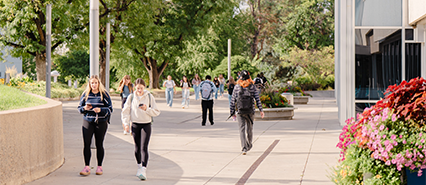Academic Freedom and Tenure
Colorado State University-Pueblo
All true democracies depend for their existence on the principle that individuals have the right to freely express their ideas without fear of censure or reprisal. Nowhere is this principle more important than in a university, where the discussion, creation, and evaluation of ideas take place. Accordingly, the Colorado State University-Pueblo Faculty Senate endorses the principle of Academic Freedom.
“As citizens engaged in a profession that depends upon freedom for its health and integrity, professors have a particular obligation to promote conditions of free inquiry and to further public understandings of academic freedom.”
The purpose of the following information is to promote public understanding of academic freedom and the practice of tenure which is used to ensure academic freedom in colleges and universities.
The concept of academic freedom has long been recognized in the United States as a fundamental principle of the profession. The American Association of University Professors was formed early in the twentieth century, as a response in part to the 1900 incident in which noted economist Edward Ross lost his job at Stanford University because of his views on immigrant labor and railroad monopolies. Within Colorado’s history, conflicts involving academic freedom include a 1920 request by Governor Clarence Morley calling for the dismissal of all Catholics and Jews from the University of Colorado faculty and staff, and the 1951 dismissal of two non-tenured University of Colorado instructors during the McCarthy era.
From its inception, the American Association of University Professors has recognized that membership in the academic profession carries with it special responsibilities.
“Academic freedom is essential to the furtherance of the common good,” which is the governing principle of institutions of higher education. “The common good depends on the free search for truth” and the free expression of ideas in that search. “Freedom in research is fundamental to the advancement of truth. Academic freedom in teaching is fundamental for the protection of the right of the teacher in teaching and the right of the student to freedom in learning.”
“Teachers are entitled to full freedom in research and in the publication of the results, subject to the adequate performance of their other academic duties.” “Teachers are entitled to freedom in the classroom in discussing their subject, but they should be careful not to introduce controversial matter that has no relation to their subject.” “Controversy is at the heart of the free academic inquiry,” but teachers need to “avoid persistently intruding material which has no relation to their subject.”
“College and university teachers, when they speak or write as citizens, should be free from institutional censorship or discipline, but their special position in the community imposes special obligations. The public may judge their profession and their institution by their utterances. Hence they should at all times be accurate, should exercise appropriate restraint, should show respect for the opinions of others, and should make every effort to indicate that they are not speaking for the institution.” “A faculty member’s expression of opinion as a citizen cannot constitute grounds for dismissal unless it clearly demonstrates the faculty member’s unfitness for his or her position,” based on the standards and procedures normally applied in any evaluation of faculty members.
Tenure in higher education is a practice designed to protect freedom in teaching and research, and to guarantee a degree of economic security, in order to attract men and women of ability. Academic tenure is not a ‘life-time’ contract, but a protection from firing for unjust causes. It is a way of maintaining free discourse in the university. At Colorado State University–Pueblo, the tenure decision is made after a long, rigorous review taking up to six years of probationary service. If and when tenure is granted, the professor must still complete annual reviews, and if the professor falls below the standards and expectations of his or her position, must come up with and implement a plan to remedy the situation, or face possible termination.
We recognize the responsibility associated with our roles as professors; however, we also accept that freedom of speech must be defended for all – including those with unpopular or controversial views. An environment that supports the discussion and debate of all viewpoints, without threat of control or sanction by government bodies, is central to the mission of a public university. The mission of higher education can only be achieved if the decisions about what may be taught or studied, who may teach, academic freedom in research and in the classroom, and tenure are left in the hands of faculty peers and the academic institution.


